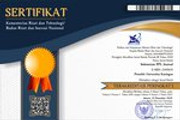UTILIZING QUIPPER SCHOOL FOR IMPROVING READING COMPREHENSION OF RECOUNT TEXT
Abstract
This study aims at explaining the implementation of using Quipper School for improving reading comprehension of recount text and also describing the students’ engagement in the use of this digital media. This research design employed qualitative descriptive. The data collection technique used interview and documentation. To analyze the data, the researchers used data reduction, data mapping, inference, or validation. The participants of this study were the eleventh grade students and the English teacher at a public high school in Semarang, Indonesia. The research shows that students and the teacher have been helped in the teaching and learning process using Quipper School application. Students can learn reading materials with this digital medium during online learning due to the Covid19 pandemic. Students also enjoy discussion and interest in educational materials that are easy to implement and have easy access to the digital media. There were also interactive conversations about student learning issues to help students understand the reading content materials more easily.
Keywords: digital media; learning; Quipper school; reading; recount text
Full Text:
PDFReferences
Agustina, E., & Cahyono, B.Y. (2017). Perceptions of Indonesian teachers and students on the use of Quipper School as an online platform for extended EFL learning. Journal of Language Teaching and Research, 8(4), 794-800. ISSN 1798-4769. DOI: http://dx.doi.org/10.17507/jltr.0804.20.
Ajmal, M., Alrasheedi, S., Keezhatta, M.S., & Yasir, G.M. (2020). COVID-19 and online English language teaching: students’ response and feedback. Asian ESP Journal, 16(5.2), 39-56.
Bakri, I., Pammu, A., & Nasmilah. (2021). High school students’ perception on the comprehensibility of the English teaching material provided online over the crisis of Covid-19. International Journal of Innovative Science and Research Technology, ISSN No. 2456-2165. 6(1)
Bang, S., Kanokkarnkittichartchaowalit., & Saekhow, J. (2017) “Effects of Quipper School program based on local contents in Surat Thani province to enhance English listening skill of Matthayomsuksa V students”, International Journal of Management and Applied Science, 3, (1).
Cakrawati, L.M. (2017). Students’ perceptions on the use of online learning platforms in EFL classroom. English Language Teaching and Technology Journal (ELT-Tech Journal), 1(1), 22-30. URL: http://ejournal.upi.edu/index.php/ELTTech/article/view/9428.
Creswell, J. W. (2014). Research design: qualitative, quantitative, and mixed methods approaches, 4th Edition, Los Angeles: SAGE.
Creswell, J. W. & Timothy, C.G. (2019). Educational research: planning, conducting, and evaluating quantitative, and qualitative Research, 6th Edition). New York, NY: Pearson Education, Inc.
Febrianti, L., Mulyadi., & Hati, G.M. (2018). Students’ attitude toward Quipper School as an English online learning media at SMAN 1 Arga Makmur Bengkulu Utara. Journal of English Education and Teaching (JEET), 2(1).
Felstead, P.M.P. (2018). The Effectiveness of blended method with Quipper in the teaching of T.L.E.- ICT to grade 9 students. Multidisciplinary Research Journal. 1 (2), Special Issues.
Guillen, J.G. (2018). Quipper School- based English teaching. International Journal of Social Science and Humanities Research. ISSN 2348-3164, 6(3), 875-891.
Hamad, M.M. (2017). Prons and cons of using Blackboard Collaborate for blended learning on students’ learning outcome. Journal of Higher Education Studies, 7(2), 7-16.
Hanah, D., Lisniyanti, K., & Yulianto, S.W. (2020). Investigating students’ reading interest on English reading materials through their reading habits during a pandemic. ELT in Focus Journal, 3(2), 14-23, doi: 10.35706/eltinfc. v3i2.4585.
Ja’ashan, M.M. (2020). The challenges and prospects of using E-learning among EFL students in Bisha University. Arab World English Journal, 11(1), 124-137.
Jamil, W., Ampa, A.T., & Ilmiah. (2019). The students’ learning interest of Quipper School used by the teacher in teaching English: Descriptive research. Exposure Journal, 8(2), 141-157, E-ISSN: 2502-3543.
Khafaga, A.F., & Shaalan, I.E.A.W. (2021). Mobile learning perception in the context of COVID-19: An Empirical study of Saudi EFL majors. The Asian EFL Journal, 28(1.3)
Miles, M.B., Huberman, A.M, & Saldana, J. (2014). Qualitative data analysis: A Methods source book. Thousand Oaks, California: SAGE Publications.
Rachma, S.Y. (2021). Teacher and students’ perception towards the implementation of Quipper School in English subject. E-Journal of Research on English Language Teaching in Indonesia (RETAIN), 9(3), 18-26. ISSN 2356-2617.
Sulisworo, D., Sulistyo, E.N., & Akhsan, R.N. (2017). “The motivation impact of open educational resources utilization on Physics learning using Quipper School App”. Turkish Online Journal of Distance Education TOJDE. ISSN 1302-6488, 18. 4 (9).
Tracy, S.J. (2013). Qualitative research method: collecting evidence, crafting analysis, communicating impact. UK: Wiley-Blackwell.
Wijanayu, A., Hardyanto, W., & Isnaeni, W. (2018). Blended learning method based on Quipper School to improve concepts understanding and independence learning. Journal of Primary Education, 7(1). http://journal.unnes.ac.id/sju/index.php/jpe
DOI: https://doi.org/10.25134/ieflj.v8i1.5660
Refbacks
- There are currently no refbacks.

This work is licensed under a Creative Commons Attribution-ShareAlike 4.0 International License.

